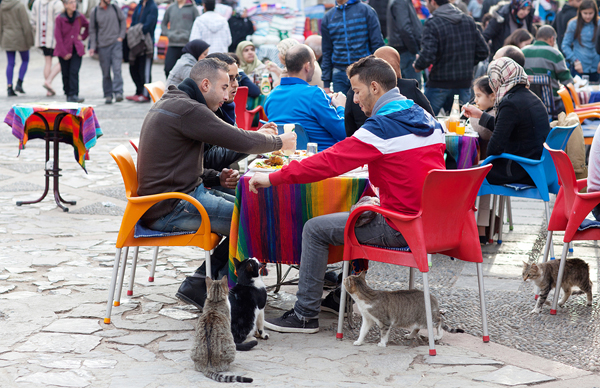Culture Shock in Morocco
Summary: If you're planning a move to Morocco, or have recently settled there, it's natural to encounter some culture shock as you adjust to your new surroundings. Our insightful article is designed to help you navigate this transition smoothly. It offers practical tips and draws on the experiences of fellow expats who have successfully embraced the cultural nuances of Morocco.

Welcome to the vibrant and diverse world of Morocco! As you prepare for your move, it's natural to anticipate the excitement and challenges that come with adapting to a new culture. Morocco offers a rich tapestry of traditions, languages, and customs that can be both enchanting and bewildering for newcomers. Understanding the potential culture shock and learning how to navigate the social landscape will help you settle in more comfortably. Here's what you need to know to ease your transition into Moroccan life.
1. Understanding Culture Shock in Morocco
When you first arrive in Morocco, the initial excitement often gives way to a rollercoaster of emotions as you encounter unfamiliar customs and social norms. Culture shock typically unfolds in phases, starting with the 'honeymoon' period, where everything seems fascinating and new. This can be followed by a period of frustration or confusion as differences become more apparent. Eventually, you'll enter a phase of gradual adjustment, learning to understand and appreciate the nuances of Moroccan culture. Finally, you'll reach a level of acceptance and comfort, feeling more at home in your new surroundings.
2. Language Barrier Challenges
While Morocco's official languages are Arabic and Tamazight, French is widely spoken, especially in business and urban areas. If you're still learning Arabic or French, you may find communication to be a significant hurdle. Daily interactions, from shopping at the souk to dealing with bureaucracy, can be challenging. However, Moroccans are generally patient and appreciative of any effort to speak their language. Taking language classes and practicing with locals can greatly enhance your experience and ease your integration into Moroccan society.
3. Top Cultural Faux Pas to Avoid
- Dressing Inappropriately: Morocco is a Muslim-majority country, and modesty in dress is valued. It's important to respect local sensibilities by avoiding revealing clothing, especially in non-touristic areas.
- Disregarding Religious Customs: During the holy month of Ramadan, eating, drinking, or smoking in public during daylight hours is frowned upon, even for non-Muslims.
- Refusing Hospitality: Moroccans are known for their hospitality. Declining an offer for tea or a meal can be seen as rude. It's polite to accept, even if only for a small amount.
- Ignoring Bargaining Etiquette: Haggling is a part of shopping in Morocco's markets. Offering too low a price or not engaging in the bargaining process can be considered disrespectful.
- Photographing People Without Permission: Always ask for permission before taking photos of people, especially women and children. Some may find it intrusive or offensive.
4. Expat Advice on Culture Shock
Long-term expats in Morocco often emphasize the importance of patience and an open mind. One American expat shared how joining a local cooking class not only improved her Arabic but also helped her understand the cultural significance of food in Moroccan society. Another expat from France highlighted the value of building a local support network through community events and expat groups, which can provide a sense of belonging and shared experiences. Most importantly, expats recommend embracing the differences, celebrating the country's festivals, and learning the local customs, as these actions can transform culture shock into a rewarding journey of discovery.
Morocco's rich cultural landscape is as challenging as it is rewarding. By preparing for the phases of culture shock, making an effort to overcome language barriers, avoiding cultural missteps, and heeding the advice of seasoned expats, you'll be well on your way to a fulfilling life in this beautiful North African nation. Remember, the key to a smooth transition is to approach each day with curiosity, respect, and a willingness to learn.
About the Author
 Betsy Burlingame is the Founder and President of Expat Exchange and is one of the Founders of Digital Nomad Exchange. She launched Expat Exchange in 1997 as her Master's thesis project at NYU. Prior to Expat Exchange, Betsy worked at AT&T in International
and Mass Market Marketing. She graduated from Ohio Wesleyan University
with a BA in International Business and German.
Betsy Burlingame is the Founder and President of Expat Exchange and is one of the Founders of Digital Nomad Exchange. She launched Expat Exchange in 1997 as her Master's thesis project at NYU. Prior to Expat Exchange, Betsy worked at AT&T in International
and Mass Market Marketing. She graduated from Ohio Wesleyan University
with a BA in International Business and German.
Some of Betsy's articles include 12 Best Places to Live in Portugal, 7 Best Places to Live in Panama and 12 Things to Know Before Moving to the Dominican Republic. Betsy loves to travel and spend time with her family. Connect with Betsy on LinkedIn.
Additional Information:
- Morocco Guide
- Healthcare & Health Insurance in Morocco
- Members Talk about Healthcare & Health Insurance in Morocco
- Best Places to Live in Morocco
- Real Estate in Morocco
- Guide to Real Estate in Morocco
- Pros & Cons of Living in Morocco
- Cost of Living in Morocco
- Having a Baby in Morocco
- Health Insurance for Expats in Morocco
- Best Places to Visit in Morocco for Christmas Cheer
- Christmas in Morocco
- Pros and Cons of Living in Morocco 2025
- 2025 Guide to Moving to Morocco




